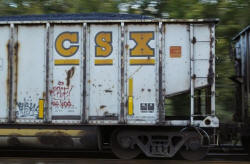CSX outlines path forward after death of former CEO
Harrison
 Send a link to a friend
Send a link to a friend
 [March 01, 2018]
By Eric M. Johnson [March 01, 2018]
By Eric M. Johnson
(Reuters) - U.S. railroad operator CSX Corp
on Thursday reaffirmed its longer-term plan for boosting profitability
and outlined financial targets for the next two years, ahead of its
first investor day after the death of former chief executive officer,
Hunter Harrison.
Harrison, a favorite of investors for leading turnarounds of two
Canadian railroads, died in December just eight months into an overhaul
that included shutting multiple rail yards, deep job cuts, mothballing
locomotives and running trains on tight schedules rather than based on
customer needs.
The railroad reaffirmed that it would substantially lower its operating
ratio - a closely watched measurement of profitability – to 60 percent
by 2020 from 67.9 percent at year-end 2017. The operating ratio is a
measure of operating expenses as a percentage of revenue.

Florida-based CSX said it expected revenue growth at a compound annual
rate of 4 percent in 2019 and 2020.
The new CEO, Jim Foote, and his management team are due to address
investors at a conference in New York on Thursday, where investors will
be eager for details on how much work is left to be done.
CSX said it expected cumulative free cash flow of $8.5 billion from 2018
to 2020 and average annual capital expenses of $1.6 billion through
2020.
[to top of second column] |

A CSX gondola car full
of coal moves through the switchyard in Brunswick, Maryland October
16, 2012. REUTERS/Gary Cameron

CSX shares have risen about 50 percent since January 2017 and about 12 percent
since March 2017 after Harrison took over as CEO following a high-stakes push by
activist investor Paul Hilal of investment fund Mantle Ridge LP.
But CSX's share growth has come with depleted rail service. Many rail customers
have seen persistent service disruptions and delays that have raised shipping
costs.
Several shippers have told Reuters that service has been steadily improving from
a nadir last summer, although companies like U.S. agricultural firm Cargill Inc
and coal company Murray Energy Corp are still struggling with crew and rail car
shortages.
(Reporting by Eric M. Johnson in Seattle and Arunima Banerjee in Bengaluru;
Editing by Peter Cooney, Bernard Orr)
[© 2018 Thomson Reuters. All rights
reserved.] Copyright 2018 Reuters. All rights reserved. This material may not be published,
broadcast, rewritten or redistributed.
Thompson Reuters is solely responsible for this content.
 |